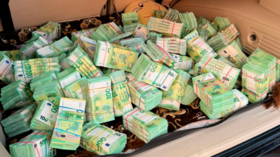$5 million in ‘black money’ seized from Ukrainian army food supplier

Ukrainian law enforcement officials have seized more than $5 million from a company supplying food to the Ukrainian army, as part of an inquiry into a suspected tax evasion scheme, the nation’s Economic Security Bureau (BEB) reported on Friday.
Stacks of cash were found in the company accountant’s car when it was intercepted by security officials in Kiev Region. The BEB also reported that she sought to hide a “black cash register” and to conceal the firm’s illicit operations during the investigation.
The authorities published photos of the woman’s car trunk filled with numerous bundles of euro banknotes. According to the BEB, the amount seized was €4.7 million ($5.13 million). Searches were also conducted on the firm’s premises and in the apartments of some of its staff members.
The BEB did not name the company in question, but said it provided food supplies to the Ukrainian military under Defense Ministry contracts. From 2022 to 2023, the company delivered food products to the Defense Ministry worth 14.5 billion hryvnia ($352 million), the bureau said.
At the time, the authorities also obtained data on non-commodity transactions made by the company that had “signs of fictitiousness,” the BEB statement said. According to investigators, the firm unjustifiably inflated its expenses to receive tax credit through falsified documentation and by overestimating the prices of the goods it was purchasing. The scheme allowed it to avoid taxes “on a particularly large scale.”
Ukraine has been plagued by corruption and embezzlement for years. The conflict with Russia has made the problem even more apparent. Kiev’s Western backers have voiced concerns over the issue, while the Ukrainian military has been rocked by several high-profile procurement scandals in recent months.
In May, Robert Storch, the Pentagon’s inspector general, released a report stating that “endemic corruption persists” in Ukraine, pointing to “the misuse of wartime resources and weapons procurement funds” within the nation’s defense sector. He also listed “bribes, kickbacks, and inflated procurement costs” among the most common risks within the Ukrainian Defense Ministry.
Earlier the same month, Ukrainian media reported the claims of an anti-corruption activist that the Kharkov Region authorities embezzled or stole 7 billion hryvnias ($176.5 million) allocated for defense fortifications at the border with Russia.
In June, the EU set up a special watchdog to combat the potential embezzlement of billions of dollars allocated to Ukraine. In July, the Daily Telegraph reported that many NATO members believe Ukraine is “too corrupt” to join the bloc.
In its annual Corruption Perception Index published in January, Transparency International ranked Ukraine 104th out of 180 countries.














